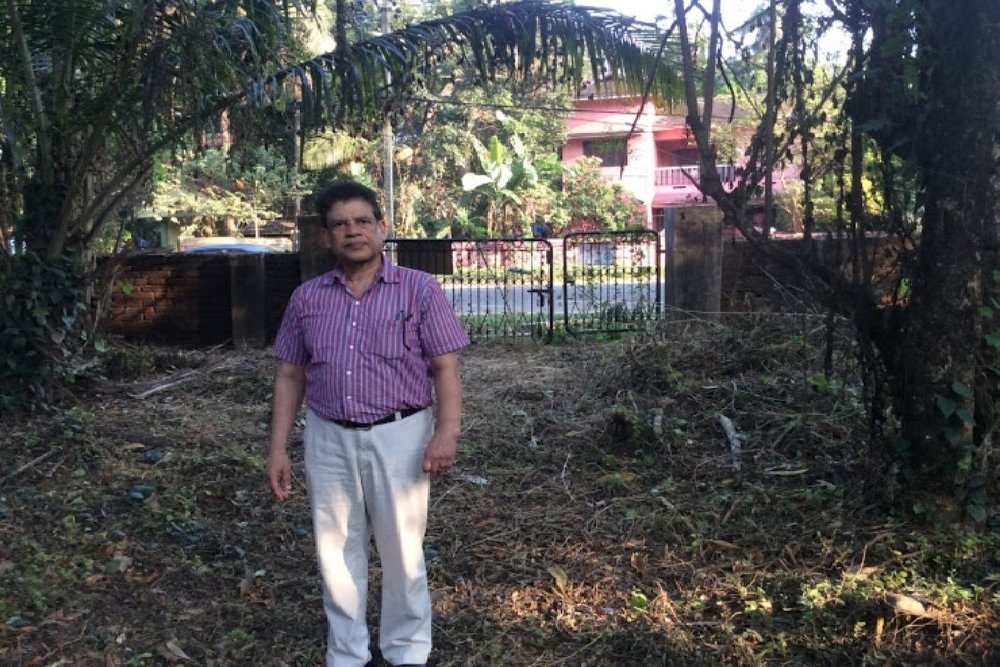From 1976 onwards, I was working in community hospitals in Nigeria.Each time I visit Thrissur, India, my parents used to extol the virtues of owning a plot of land and building one’s house there. They were of the opinion that the property prices will go only one way, that is upwards only! When I visited Thrissur in 1979,I determined to buy a plot of land with a view to construct a house later. I engaged several real estate brokers who showed me different types of properties. Normally they get 2.5% brokerage from the buyer and 2.5% from the seller. These brokers do not have any established business or real estate shop. Unlike in the western countries, the brokers do not keep any sale sign board.
I learned from real estate experts about choosing properties. I realised that the location and the potential for growth of the locality are more important than the décor or size of the house . Also I was advised to check for the intact fencing, proximity to busy roads, level ground, and water and electricity availability. Unlike in the U.K., solicitors are not normally involved in the buying or selling of properties in India. I visited four properties, and the one I liked was a 62 cents plot with an old house in the centre. This was a rectangular plot of land with the longer side facing the national high way. There was a well with a motor pump in a shed, and in the plot there were many coconut trees, mango trees, and jack fruit trees. On the west side, the property was occupied by a Klonar, back side by a Bhaskaran and on the east side there was a narrow road. The old house in the centre was occupied by Hamsa. The property was owned by Pikkada Khader who agreed to sell it for the market price, subject to survey, and vacant possession of the house. The sale and purchase contract was phrased and written by a title and document writer. A non refundable deposit was given to Khader when the contract was signed. It was mutually agreed to complete the transfer in mid March 1980. The contract was between Khader and my brother.The closure was six months after the contract date. Then I went Nigeria, and was getting regular letters from my brother about the progress of the matter and the facility for fund to close the transfer.Those days there were no other means of communication except postal letters delivery, and normally it takes two weeks to deliver a letter in Nigeria posted from India. That period was an anxious one, as the seller can be persuaded to sell it for a higher value. I was informed that the seller did not complete the transfer on the stipulated date, because Hamsa could not get another suitable accommodation to move out. Also the seller, Khader was obstructing the process by asking more money to evict Hamsa, for watering coconut trees and for not plucking tender coconuts. My brother agreed and paid whatever the seller asked for to facilitate a smooth closure. Again I was informed that the seller was becoming more rude and obstructive , there upon my late father, and brother in-laws approached Khader and threatened him of legal action for the breach of the sale and purchase contract. At last to my delight, one day in early April 1980, I received a letter( posted fourteen days earlier)informing me that the closure was done at last.
Being the owner of the property, gave me some joy, but then I was regularly getting letters from my father that cattle and goats are entering the property because of the dilapidated fence, and if I do not construct a compound wall, nearby people will encroach or squat in the the vacant house. The next time I visited Thrissur was in 1981, and then I decided to construct a compound wall on the perimeter as a matter of urgency, replacing the fence. This is not as simple as one thinks, as I have to get labourers, surveyors, materials including custom made gate, and above all to get the neighbours on my side! First I engaged the surveyors for measuring the exact boundaries on four sides and get them in a straight line by tying either ends of the string tense to sticks in each corners. The labourers have to excavate the earth, prior to brick layers paving bricks in the cavity. At this point the inquisitive neighbours launched into angry tirade about the excavation without their permission. Again I called my father and brother in laws to explain to them in a relaxed manner that I am constructing the compound wall utilising my own land, and that the compound wall is good to safeguard everyon’'s property. In the front part of the compound wall facing the national high way, a wide iron gate was installed. The next thing I did was demolishing the old house, and repairing the motor pump shed and pipes. As the property was secured, and there was availability of water, my father showed keen interest in looking after the property. He enjoyed walking over two miles to get to the property most days from late 1981 onwards. He used to start the motor pump and water coconut trees and other kitchen garden. That kept my father busy in his retired life and he derived great pleasure in engaging with the community there for many years.I realised owning a property while living abroad involved in a lot of anxieties, uncertainties and hardships, but I took these as a challenge.
BY DR.C.J.GEORGE

Comment Form